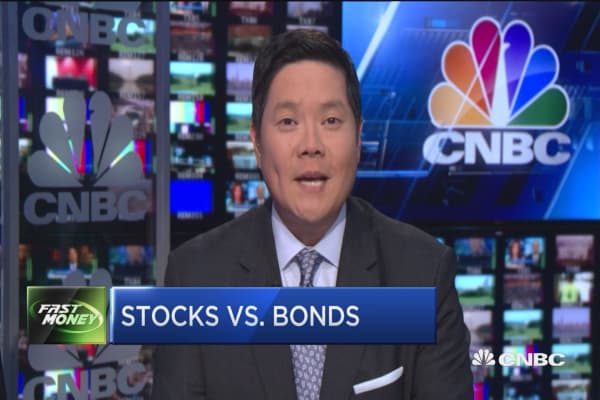Buying stocks vs bonds
Here, we look at the difference between stocks and bonds on the most fundamental level.
Stocks and bonds represent two different ways for an entity to raise money to fund or expand their operations. When a company issues stock, it is selling a piece of itself in exchange for cash. When an entity issues a bond, it is issuing debt with the agreement to pay interest for the use of the money.
Stocks? Bonds? What's the right mix? - Ultimate Guide to Retirement
Stocks are simply shares of individual companies. The owners wish to expand, but they are unable to do so solely through the income they earn through their operations.

As a result, they can turn to the financial markets for additional financing. Bonds , on the other hand, represent debt. A government, corporation, or other entity that needs to raise cash borrows money in the public market and subsequently pays interest on that loan to investors.
Bonds vs. stocks (video) | Stocks and bonds | Khan Academy
Upon maturity, the investor is returned the full amount of his or her original principal except for the rare occasion when a bond defaults i. Since each share of stock represents an ownership stake in a company — meaning the owner shares in the profits and losses of the company - someone who invests in the stock can benefit if the company performs very well and its value increases over time. At the same time, he or she runs the risk that the company could perform poorly and the stock could go down — or, in the worst-case scenario bankruptcy — disappear altogether.
Stocks and Bonds: Differences and Definitions
However, they also tend to provide superior long-term returns. Stocks are therefore favored by those with a long-term investment horizon and a tolerance for short-term risk.
Bonds lack the powerful long-term return potential of stocks, but they are preferred by investors for whom income is a priority. Also, bonds are less risky than stocks.
While their prices fluctuate in the market — sometimes quite substantially in the case of higher-risk market segments - the vast majority of bonds tend to pay back the full amount of principal at maturity, and there is much less risk of loss than there is with stocks.

Many people invest in both stocks and bonds in order to diversify. Deciding on the appropriate mix of stocks and bonds in your portfolio is a function of your time horizon, tolerance for risk , and investment objectives.
What are the advantages and disadvantages of buying stocks instead of bonds?
Search the site GO. Updated April 17, Stocks Are Ownership Stakes, Bonds are Debt Stocks and bonds represent two different ways for an entity to raise money to fund or expand their operations.
What is a Bond? Bonds vs. Stocks -- Stock Market Education -- Investing Courses and TutorialsWhich Is Right for You? Get Daily Money Tips to Your Inbox Email Address Sign Up. There was an error. Please enter a valid email address.

Personal Finance Money Hacks Your Career Small Business Investing About Us Advertise Terms of Use Privacy Policy Careers Contact.